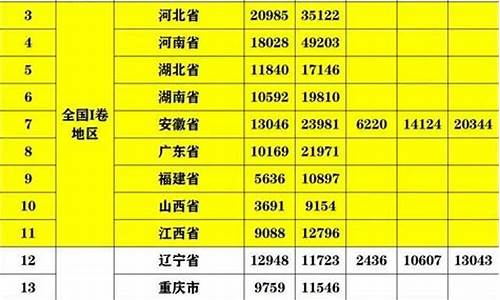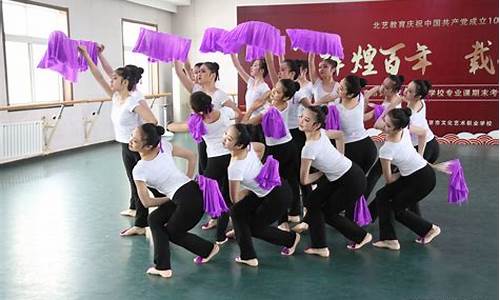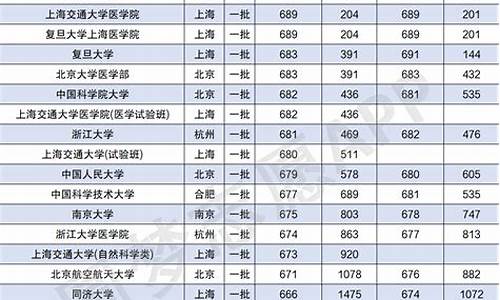您现在的位置是: 首页 > 教育政策 教育政策
英语名词高考-高考英语名词知识点总结
tamoadmin 2024-09-04 人已围观
简介1.所有名词的用法2.高考英语中关于抽象名词和名词的用法具体分析,悬赏30分3.求高考英语高频率词汇。4.高考英语引导名词性从句辨析5.高考英语语法:高中英语语法-名词性从句所有名词的用法名词按其所表示的事物的性质分为可数名词和不可数名词。还有一些词既是可数名词,又是不可数名词,如: ice-cream、salad、chicken。一、可数名词变复数的规则变化(1)一般情况下名词变复数直接在名词词
1.所有名词的用法
2.高考英语中关于抽象名词和名词的用法具体分析,悬赏30分
3.求高考英语高频率词汇。
4.高考英语引导名词性从句辨析
5.高考英语语法:高中英语语法-名词性从句
所有名词的用法

名词按其所表示的事物的性质分为可数名词和不可数名词。
还有一些词既是可数名词,又是不可数名词,如: ice-cream、salad、chicken。
一、可数名词变复数的规则变化
(1)一般情况下名词变复数直接在名词词尾加-s就可以。
(2)以-s、-x、-ch、-sh等结尾的名词变复数,需要在词尾加-es。
(3)以辅音字母+y结尾的名词,便y为i再加-es?。
(4)以-f或-fe结尾的名词变复数,变-f或-fe为v,再加-es。
(5)以o结尾的名词变复数时,注意词末为两个元音字母的词只加-s。
二、不可数名词“数量”?的表示方法
在英语中,不可数名词如果要表示“量”的概念,可以用以下两种方法:
(1)用much,a little,little、a lot of / lots of,、plenty of、some,any等表示多少,
例如:a lot of milk许多牛奶
(2)用“数词+表示数量的名词+of+不可数名词”?这类短语(a piece of……)表示。
如:a piece of bread/a piece of paper /? a glass of water(milk)/ a cup of tea / a bag of rice
如果要表示“两杯茶”、“四张纸”这类复数概念时,在容器后加复数,例如:
two cups of tea / four pieces of paper / there glasses of water
扩展资料:
1、名词可作主语、宾语,有时也可作定语。
2、动词,可用作谓语,不定式to do等。
3、形容词可作定语修饰名词,也可单独使用,作表语。
4、副词可单独使用,也可以修饰动词和形容词。
5、代词可作主语,也可作宾语或者表语。
6、介词可与动词构成词组,也可以与名词构成介词短语,作表语、状语等。
7、数词作定语与名词共用,或者构成时间。
8、连词,顾名思义,连接两个句子,并能表示两个句子之间的关系。
9、冠词,加在名词前面,表示限定(the)和数量(a/an)。
10、感叹词用于表达一种惊奇,生气,喜悦等感情。
高考英语中关于抽象名词和名词的用法具体分析,悬赏30分
这个应该说分很多种,详细来写一个版面也不够。其实各种辅导资料中都有介绍,我觉得比较好的是《星火英语语法》和《三年高考五年模拟》,前者介绍详细,后者例题很多。两者一个比较大的区别就是抽象名词前面一般没有冠词或物主代词,而具体名词一般是加冠词、物主代词或为可数名词的复数形式。两者都可以表示一类事物,比如the olds 就表示老人。还是希望你通过辅导书来学习详细的规则。高考中考查名词主要是在单项选择中,大约两道三个题目,不是很难,稍加练习就ok了。
求高考英语高频率词汇。
高中英语合集百度网盘下载
链接:s://pan.baidu/s/1znmI8mJTas01m1m03zCRfQ
?pwd=1234提取码:1234
简介:高中英语优质资料下载,包括:试题试卷、课件、教材、、各大名师网校合集。
高考英语引导名词性从句辨析
#高考# 导语英语是高考备考的重点,也是难点,很多词,英语易错词汇短语同学们分不太清楚,为帮助同学们解决这一重点难点, 考 网整理了《高考英语易错词汇短语辨析》,供参考。 whatever,whoever,whichever引导名词性从句
一、基本用法概说
英语中的-ever 词主要包括 whatever, whoever, whichever, whenever, wherever, however 等,其中可引导名词性从句的主要有whatever, whoever,whichever.这里所说的名词性从句主要指主语从句和宾语从句,它们通常不用于引导同位语从句,同时也很少用于引导表语从句。如:
Whatever he said was right. 无论他说什么都是对的。(引导主语从句)
I don‘t believe whatever he said. 无论他说什么我都不信。(引导宾语从句)
在某些特定的语境中,也可用于引导表语从句。如:
What he wants to get is whatever you he. 他想得到的是你所拥有的一切。
二、whatever引导的名词性从句
whatever的意思是“所……的一切事或东西”,可视为what的强调说法,其含义大致相当于anything that,whatever在从句中可用作主语、宾语、定语。如:
Do whatever she tells you and you‘ll he peace. 她叫你干什么你就干什么,那你就太平了。
I don‘t believe in letting children do whatever they like. 我不赞成让孩子为所欲为。
Goats eat whatever food they can find. 山羊找到什么食物就吃什么食物。
三、whoever引导的名词性从句
whoever的意思“任何……的人”,在意义上大致相当于 anybody who.whoever在从句中可用作主语或宾语。如:
I‘ll take whoever wants to go. 谁想去我就带谁去。
Whoever says that is a liar. 说那话的人是个骗子。
She can marry whoever she chooses. 她愿意嫁谁就嫁谁。
I‘ll give the ticket to whoever wants it. 谁想要这票,我就把它给谁。
Tell whoever you like — it makes no difference to me. 你爱告诉谁就告诉谁吧,对我是无所谓的。
注:whoever既用作主语也可用作宾语(作宾语时不宜用whomever,因为在现代英语中whomever已几乎不用)。另外,注意以下受汉语意思影响而弄错的句子:谁赢了都可以获奖。
误:Who wins can get a prize.误:Anyone wins can get a prize.正:Whoever wins can get a prize.正:Anyone who wins can get a prize.
四、whichever引导的名词性从句
whichever的意思“……的那个人或事物”,在意义上大致相当于 the person or the thing that.whichever在从句中可用作主语、宾语或定语。如:You can pick whichever one you like. 你喜欢哪个就挑哪个。
Whichever of you comes first will receive a prize. 你们谁第一谁就能得奖。
We‘ll eat at whichever restaurant has a free table. 哪个饭馆有空桌我们就在哪儿吃吧。
Whichever of us gets home first starts cooking. 我们当中无论哪个先到家,哪个就先开始做饭。
五、引导状语从句的用法
whatever, whoever, whichever除用于引导的名词性从句外,还可用于引导状语从句,分别相当于 no matter what, no matter who, no matter which.如:I‘ll stand by you whatever [=no matter what] hens. 无论如何我都支持你。
Whoever [=No matter who] wants to speak to me on the phone, tell them I‘m busy. 不管谁要我接电话,就说我现在正忙。
Whichever [=No matter which] you buy, there is a six-month guarantee. 不管买哪个都有六个月的保修期。
高考英语语法:高中英语语法-名词性从句
《高中英语语法-名词性从句》由英语我整理,更多请访问:s://.liuxue86/english/。本内容整理时间为05月12日,如有任何问题请联系我们。
名词性从句
名词性从句相当于名词,可分别作主句的主语、表语、宾语和同位语。因此,名词性从句厅分为主语从句、表语从句、宾语从句和同位从句。
(一)引导名词性从句的连接词
1、连接代词:who, whose, whom, what, which。有词义,在从句中担任成分,如主语、表语、宾语、或定语等。
2、连接副词:when, where, why, how。有词义,在从句中担任成分,作状语。
3、连接词:that, whether, if, as if。that 无词义,在从句中不担任成分,有时可省略;if (whether), as if虽有词义,但在从句中不担任成分。
注意:连接代词与连接副词在句中不再是疑问句,因而从句中谓语不用疑问式。连接代词与连接副词在从句充当句子成分,连接词whether 和if(是否),as if(好象)在从句中不充当句子成分,只起连接作用。根据句义,如果连接代词与连接副词,whether、if 和as if都用不上时,才用that作连接词(that本身无任何含义)。
(二)主语从句
1、主语从句在复合句作主语。
e.g. Who will go is not important.
2、用it作形式主语,主语从句放在句末。
e.g. It doesn't matter so much whether you will come or not.
3、that引导主语从句时,不能省略。
e.g. That he suddenly fell ill last week made us surprised.
(三)表语从句
1、表语从句在复合句中作表语,位于系动词之后。
e.g. The question was who could go there.
2、引导表语从句的连接词that有时可省去。
e.g. My idea is (that) we can get more comrades to help in the work.
(四)宾语从句
1、宾语从句在复合句中作宾语。引导宾语从句的连词that一般可省略。
e.g. I hope (that) everything is all right.
2、介词之后的宾语从句,不可用which或if连接,要分别用what或 whether。
e.g. I'm interested in whether you've finished the work..
I'm interested in what you've said.
3、whether与if都可以引导宾语从句,常可互换。但下面情况不能互换。
①宾语从句是否定句时,只用if,不用whether。
e.g. I wonder if it doesn't rain.
②用if 会引起误解,就要用whether。
e.g. Please let me know whether you want to go.(此句如果把whether改成if,容易当成条件句理解)
③宾语从句中的whether 与or not直接连用,就不能换成if;不直接连用,可换。
e.g. I don't know whether or not the report is true.
I don't know whether/ if the report is true or not.
④介词后的宾语从句要用whether引导。whether 可与不定式连用。whether也可引导主语从句、表语从句、同位语从句,还可引导让步状语从句,以上均不能换成if。但引导条件从句时,只能用if,而不能用whether。
e.g. It depends on whether we he enough time.
They don't know whether to go there.
Please come to see me if you he time.
(五)同位语从句
同位语从句在句中作某一名词的同位语,一般位于该名词(如:news, fact, idea, suggestion, promise等)之后,说明该名词的具体内容。
e.g. I he no idea when he will be back.
The fact that he had not said anything surprised everybody.
练习:名词性从句
一、判断下列各句哪句含有名词性从句,并指出是什么从句:
1. China is no longer what it used to be.
2. The truth that the earth turn around the sun is known to all.
3. It was snowing when he arrived at the station.
4. How he persuaded the manager to change the plan is interesting to us all.
5. The news that they had won the game soon spread over the whole school.
6. The news that you told me yesterday was really disointing.
7. That is where Lu Xun used to live.
8. He spoke as if he understood what he was talking about.
9. Do you remember the teacher who taught us English at middle school?
10. I wonder why she refused my invitation.
二、用适当的连词填空:
1. I can't decide ____________ dictionary I should buy.
2. That's ____________ he refused my invitation.
3. I am very interested in ____________ he has improved his pronunciation in such a short time.
4. ____________ we need is more time.
5. The fact ____________ she had not said anything at the meeting surprised everybody.
6. ____________ and ____________ they will meet has not been decided yet.
7. Please tell me ____________ you are waiting for.
8. Is that ____________ you are looking for?
9. Would you please tell me ____________ the nearest post office is?
10. I don't know ____________ he will agree to the plan or not.
三、选择填空:
1. Do you see _____ I mean?
A. that B./ C. how D. what
2. Tell me_____ is on your mind.
A. that B. what C. which D. why
3. We must stick to _____ we he agreed on.
A. what B. that C. / D. how
4. Let me see _____.
A. that can I repair the radio B. whether -I can repair the radio
C. I can repair the radio D. whether can I repair the radio
5. Keep in mind _____.
A. that the teacher said B. what did the teacher say
C. that did the teacher say D. what the teacher said
6. Could you advise me _____?
A. which book should I read first B. what book should I read first
C. that book 1 should read first D. which book I should read first
7. He was criticized for _____.
A. he had done it B. what he had done C. what had he done D. that he had done it
8. Would you kindly tell me _____?
A. how can I get to the Beijing Railway Station
B. how I can get to the Beijing Railway Station
C. where can I get to the Beijing Railway Station
D. whether can I get to the Beijing Railway Station
9. Mrs. Smith was very much impressed by _____.
A. what had she seen in China B. that she had seen in China
C. what she had seen in China D. which had she seen in China
10. We took it for granted ___
A. that they were not coming B. that were they not coming
C. they were coming not D. were they not coining
11. I really don't know _____
A. I should do next B. what should I do next
C. what I should do next D. how I should do next
12. I'm afraid _____.
A. the little girl will he to be operated on
B. that will the little girl he to operate on
C. the little girl will he to operate on
D. that will the little girl he to be operated on
13. She walked up to _____ .
A. where did I stand B. where I stood
C. I stood there D. where I stood there
14. Can you tell me _____?
A. who is that gentleman B. that gentleman is who
C. who that gentleman is D. whom .is that gentleman
15. We'll give you _____.
A. that do you need B. what do you need
C. whatever you need D. whether do you need
16. They want us to know _____ to help us.
A. what can they B. what they can C. how they can D. how can they
17. We must put _____ into practice.
A. what we he learned B. that we he learned
C. that he we learned D. what he we learned
18. Did she say anything about _____?
A. that the work was to be done B. how was the work to be done
C. that was the work to be done D. how the work was to be done
19. He was never satisfied with _____.
A. what she had achieved B. had what she achieved
C. she had achieved D. that she achieved
20. These photographs will show you _____.
A. what does our village look like B. what our village looks like
C. how does our village look like D. how our village looks like
21. Peter insisted _____ he pay the bill.
A. on that B. what C. that D. on which
22. They urged _____ the library open during the vacation.
A. when B. where C. why D. that
23. We wish we could he learned _____ when we were at high school.
A. what you did B. that you had done
C. that what you did D. what did you do
24.1 will describe to you _____ I saw when there.
A. what B. that C. which D./
25. From _____ I should say he is a good worker.
A. what 1 know of him B. that I do know of him
C. what do I know of him D. that do I know of him
26. I will give this dictionary to __ wants to he it.
A. whomever B. anyone C. whoever D. someone
27._____ they will come here hasn' t been decided yet.
A. What B. That C. When D. Where
28. _____ was said here must be kept secret.
A. Who B. The thing C. Whatever D. Where
29. It is still a question _____ we shall he our sports meet.
A. if B. that C. what D. when
30. I'm going anyway. _____ she will go is up to her to decide.
A. If or not B. Whether or not C. If D. That
31. It is strange _____ she he left without saying a word.
A. that B. what C. why D. how
32. It is very clear _____ our policy is a correct one.
A. what B. that C. why D. where
33. _____ Mr Zhang said is quite right.
A. That B. When C. What D. Whether
34. It has been decided _____ he will be sent there.
A. if B. whether C. why D. that
35. It doesn' t matter _____he' s come back or not.
A. if B. whether C. that D. when
36. It's a great pity _____ we won't be able to finish the task on time.
A. when B. that C. why D. where
37. It hened _____ I wasn't there that day.
A. when B. why C. where D. that
38._____ you he done might do harm to other people.
A. What B. That C. Which D. The things
39. _____ lees the room last ought to turn oft the lights.
A. Anyone B. The person C. Whoever D.Who
40._____ the 2000 Olympic Games won't be held in Beijing is known to all.
A. Whether B. If C. Whenever D. That
41. _____ fails to see this will make a big mistake.
A. That B. Whoever C. Whether D. Whether or not
42. __ we need more equipment is quite obvious.
A. What B. Whether C. That D. Whatever
43. Has it been announced _____?
A. when are the planes to take off B. that are the planes to take off
C. where are the planes to take off D. when the planes are to take off
44. That is _____ we all support his idea.
A. what B. why C. where D. when
45. That's _____ we should do.
A. that B. what C. how D. why
46. _____ is troubling me is _____ I don't understand _____ he said
A. What; that; what B. What; what; what
C. That; that; what D. Why; that; which
47. Things were not _____ they seemed to be.
A. when B. why C. that D. what
48. That's _____ I want to say.
A. all what B. what C. all which D. what that
49. That's _____ .
A. where our differences lie B. our differences lie there
C. where do our differences lie D. that where our differences lie
50. That is _____ .
A. where lived he there B. where did he live
C. where he lived D. that where he lived
51. The questions is _____.
A. whether is it worth doing B. that if it is worth doing
C. whether it is worth doing D. if it is worth doing
52. Water will continue to be _____ it is today next in importance to oxygen.
A. how B. which C. what D. as
53. That's_____.
A. how did I become a teacher B. how I became a teacher
C. how a teacher I became D. that I became a teacher
54. They are just _____.
A. that what shall I he B. what shall I he
C. that I shall he what D. what I shall he
55. It looked ____.
A. as if it was going to rain B. that as if it was going to rain
C. as if was it going to rain D. as if that it was going to rain
56. That's_____.
A. how she did it B. that how did she do it.
C. how did she do it D. what she did it
57. That is _____ we decided to put the discussion off.
A. where B. which C. that D. why
58. That's _____ I lived when I was ten years old.
A. where B. at which C. there where D. when
59. My suggestion is _____ we should send a few comrades to help them.
A. if B. that C. when that D. that where
60. The idea _____ all people are selfish is wrong.
A. what B. that C. why D. if
61. We heard the news _____ our team had won.
A. that B. what C. whether D. why
62. The fact _____ he hadn't said anything surprised us all.
A. why B. if C. that D. whether
63.I he no idea _____ she will be back.
A. that B. where C. that when D. when
64. We must keep in mind the fact _____ China is still a developing country.
A. whether B. that C. why D. when
65. They he no idea at all _____.
A. where he has gone B. where did he go
C. where has he gone D. which place he has gone 《高中英语语法-名词性从句》由英语我整理,更多请访问:s://.liuxue86/english/









